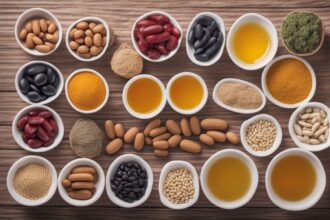Hey there, fasting enthusiasts! If you’re diving into intermittent fasting (IF) or extended fasting for weight loss, mental clarity, or overall wellness, you’ve probably wondered how to make the most of your fasting journey. While fasting is powerful on its own, certain supplements can support your body, ease the process, and help you avoid common pitfalls like fatigue or nutrient deficiencies. Today, we’re exploring the best fasting supplements to enhance your experience. From electrolytes to vitamins, I’ll break down what works, why it matters, and how to use these fasting support supplements safely. Let’s dive into the science and practical tips to keep you thriving during your fasts!
What Are Fasting Supplements, and Why Do You Need Them?
Fasting, whether it’s a 16:8 intermittent fasting schedule or a multi-day water fast, puts your body in a unique metabolic state. While it can trigger benefits like autophagy and fat burning, it also means you’re not consuming food—and potentially missing out on essential nutrients. Fasting supplements are specific nutrients or compounds taken during fasting periods to support energy, hydration, and overall health without breaking your fast. These aren’t meal replacements; they’re targeted aids to help your body handle the stress of fasting.
The need for fasting health supplements often arises from challenges like electrolyte imbalances, hunger pangs, or dips in energy. For instance, when you fast, your body depletes glycogen stores and loses water and salts, which can lead to headaches or cramps (Institute of Medicine, 2005). The right supplements can counteract these effects, making fasting more sustainable. Let’s explore how the best fasting supplements can fit into your routine.
Top Electrolytes: The Foundation of Fasting Support
Electrolytes are hands-down the most critical fasting support supplements. Sodium, potassium, and magnesium are lost through urine and sweat during fasting, especially if you’re active or following a prolonged fast. Without replenishing them, you risk symptoms like dizziness, muscle cramps, or the dreaded “keto flu” if you’re combining fasting with a low-carb diet (Volek & Phinney, 2011). Here’s how to prioritize electrolytes as some of the best fasting supplements for your journey.
- Sodium: Add a pinch of high-quality sea salt to your water. Aim for 1–2 grams daily during fasting to maintain blood pressure and nerve function.
- Potassium: Look for a no-calorie potassium supplement or use a salt substitute like LoSalt. Target 2,000–3,000 mg daily to support muscle and heart health.
- Magnesium: A fasting-friendly magnesium citrate or glycinate supplement (200–400 mg) can prevent cramps and promote relaxation.
Pro tip: Mix these into a glass of water for a DIY electrolyte drink. Avoid sugary sports drinks—they’ll spike insulin and break your fast. Keeping electrolytes balanced is a game-changer for fasting wellness.
Vitamins and Minerals to Prevent Deficiencies
While fasting, you’re not eating, which means you might miss out on key vitamins and minerals. Although short-term fasts (under 24 hours) are generally safe, longer fasts or frequent fasting cycles can increase the risk of deficiencies over time (Johnston et al., 2016). Taking fasting-compatible supplements like a multivitamin or specific nutrients can help. Here are some of the best fasting supplements in this category.
- Vitamin D: If you’re not getting enough sunlight, a 1,000–2,000 IU supplement supports immune health and mood—crucial during fasting stress.
- B Vitamins: A B-complex can support energy metabolism, especially if you feel sluggish during fasting windows.
- Zinc: This mineral supports immunity and can be taken in a low-dose, calorie-free form (10–15 mg).
- Omega-3s: If you’re not eating fatty fish during eating windows, a fish oil capsule can reduce inflammation without breaking a fast.
Always choose supplements without added sugars or fillers, and take them with water during your fasting window if they’re calorie-free. For longer fasts, consult a healthcare provider to tailor your intake. These fasting health supplements ensure your body isn’t running on empty.
Exogenous Ketones and MCT Oil: Fuel for Fasting
If you’re fasting to achieve ketosis—where your body burns fat for fuel—exogenous ketones and MCT (medium-chain triglyceride) oil are popular fasting aid supplements. Exogenous ketones are synthetic ketone bodies you ingest to mimic the state of ketosis, potentially reducing hunger and boosting mental clarity (Stubbs et al., 2018). MCT oil, derived from coconut oil, is a fast-digesting fat that converts to ketones quickly, providing energy without carbs.
Here’s the catch: these do contain calories (about 100 per tablespoon for MCT oil), so they technically break a “pure” fast. However, many fasters use them during extended fasts for energy without spiking insulin significantly (Newport et al., 2015). Start with a small dose—1 teaspoon of MCT oil or a half-serving of ketone salts—to avoid digestive upset. These can be some of the best fasting supplements for those prioritizing ketosis over strict calorie abstinence.
Amino Acids and Protein-Sparing Options
One concern with prolonged fasting is muscle loss. While short fasts don’t typically cause significant muscle breakdown, extended fasts (over 48 hours) might if you’re not careful (Phillips & Van Loon, 2011). Branched-chain amino acids (BCAAs) or essential amino acids (EAAs) are often touted as fasting-friendly supplements to preserve muscle mass. However, they do contain minimal calories and may stimulate insulin slightly, so they’re not for everyone.
If muscle preservation is your goal, consider taking BCAAs (5–10 grams) during your fasting window, ideally before a workout. Look for unflavored, unsweetened versions to minimize insulin response. For strict fasters, focus on adequate protein intake during eating windows instead. Balancing muscle health with fasting goals is key when choosing the best fasting supplements for your needs.
Safety and Practical Tips for Using Fasting Supplements
While fasting support supplements can be incredibly helpful, they’re not a one-size-fits-all solution. Overdoing it or choosing the wrong products can lead to side effects like nausea, dehydration, or even breaking your fast unintentionally. I’ve got some practical advice to ensure you’re using the best fasting supplements safely and effectively.
First, always start with small doses to see how your body reacts—fasting already stresses your system, so don’t overwhelm it. Second, stick to reputable brands with third-party testing to avoid contaminants. Third, remember that supplements are a complement, not a crutch; prioritize hydration and rest during fasting. Lastly, if you have medical conditions or take medications, consult a doctor before adding fasting wellness supplements to your routine. Safety first!
In conclusion, fasting doesn’t have to be a struggle, and the right supplements can make a world of difference. From electrolytes to vitamins, and even ketosis boosters like MCT oil, the best fasting supplements support your body’s needs while helping you stay on track with your goals. Remember to listen to your body, start slow, and focus on quality products. Whether you’re a seasoned faster or just starting out, these fasting health supplements can enhance your experience, keeping you energized and balanced. Got a favorite fasting aid supplement or tip? Drop it in the comments—I’d love to hear how you’re making fasting work for you!
References
- Institute of Medicine. (2005). Dietary Reference Intakes for Water, Potassium, Sodium, Chloride, and Sulfate. National Academies Press.
- Johnston, C. S., Tjonn, S. L., & Swan, P. D. (2016). High-protein, low-fat diets are effective for weight loss and favorably alter biomarkers in healthy adults. The Journal of Nutrition, 146(3), 586–591.
- Newport, M. T., VanItallie, T. B., Kashiwaya, Y., King, M. T., & Veech, R. L. (2015). A new way to produce hyperketonemia: Use of ketone ester in a case of Alzheimer’s disease. Alzheimer’s & Dementia, 11(1), 99–103.
- Phillips, S. M., & Van Loon, L. J. (2011). Dietary protein for athletes: From requirements to optimum adaptation. Journal of Sports Sciences, 29(Suppl 1), S29–S38.
- Stubbs, B. J., Cox, P. J., Evans, R. D., Santer, P., Miller, J. J., Faull, O. K., … & Clarke, K. (2018). On the metabolism of exogenous ketones in humans. Frontiers in Physiology, 8, 848.
- Volek, J. S., & Phinney, S. D. (2011). The Art and Science of Low Carbohydrate Living. Beyond Obesity LLC.






